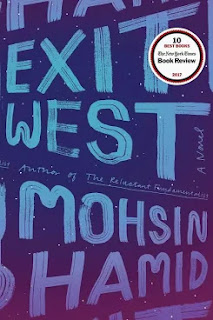Exit West by Mohsin Hamid **** (of 4)
Saeed and Nadia live in an unnamed, but all too familiar, Middle Eastern city where government forces are slowly losing the battle to Islamic militants. The young couple meet in college, before it closes, when Saeed finally finds the courage to ask Nadia out for coffee on a Friday. When Nadia asks him why he isn't going to be praying, Saeed has to stumble for an answer. Later, when Saeed asks Nadia why she remains fully covered in traditional robes even though she is not religious, Nadia replies, "So men don't fuck with me."
What follows is a courtship interspersed with car bombings, government reprisals in the form of long-distance shelling and air raids, and neighborhood by neighborhood success of young combatants drunk on power as the government slowly loses control of its country.
Escape from the city is condensed: an enormous sum of money is handed to a trafficker who might steal the money or actually provide safe passage. In Exit West, transport is accomplished by passage through secret doors. The arduous journey of most war-fleeing migrants is compressed into a single Mohammedan night journey.
Then the real work begins: surviving overcrowded camps in Greece; finding a way toward western Europe (another door, another night journey); and the discouragement of trying to make a life without money, a job, friends, or documents. If that were not enough to disrupt any relationship, add to it worry about family left at home and the inevitably poor, densely packed, unwelcoming migrant neighborhoods where new migrants are forced to locate.
After trading what little savings they have left for passage to England, Saeed and Nadia settle without money, in a grim London suburb. British nativists, with tacit support of England's police force, lay siege to Nadia and Saeed's district while launching occasional attacks on randomly selected dark-skinned, so-called foreign invaders.
Exit West is a timely reminder of the life-threatening conditions that have forced so many global refugees to abandon their homes, families, and life-savings and why it is so valuable for those of us in the West to consider greater compassion in our reckoning.
What follows is a courtship interspersed with car bombings, government reprisals in the form of long-distance shelling and air raids, and neighborhood by neighborhood success of young combatants drunk on power as the government slowly loses control of its country.
Escape from the city is condensed: an enormous sum of money is handed to a trafficker who might steal the money or actually provide safe passage. In Exit West, transport is accomplished by passage through secret doors. The arduous journey of most war-fleeing migrants is compressed into a single Mohammedan night journey.
Then the real work begins: surviving overcrowded camps in Greece; finding a way toward western Europe (another door, another night journey); and the discouragement of trying to make a life without money, a job, friends, or documents. If that were not enough to disrupt any relationship, add to it worry about family left at home and the inevitably poor, densely packed, unwelcoming migrant neighborhoods where new migrants are forced to locate.
After trading what little savings they have left for passage to England, Saeed and Nadia settle without money, in a grim London suburb. British nativists, with tacit support of England's police force, lay siege to Nadia and Saeed's district while launching occasional attacks on randomly selected dark-skinned, so-called foreign invaders.
Exit West is a timely reminder of the life-threatening conditions that have forced so many global refugees to abandon their homes, families, and life-savings and why it is so valuable for those of us in the West to consider greater compassion in our reckoning.

Comments
Post a Comment